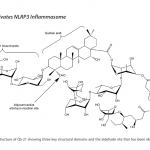
QS-21 enhances the early antibody response to oil adjuvant foot-and-mouth disease vaccine in cattle
Can Çokçalışkan, Tunçer Türkoğlu, Beyhan Sareyyüpoğlu, Ergün Uzunlu, Ayca Babak, Banu B. Özbilge, Veli Gülyaz
Foot-and-mouth disease (FMD) is one of the most important animal diseases in the world. Although there are several methods to combat the disease, the preferred meth- od in endemic regions is vaccination. FMD vaccines are composed of inactivated whole virus particles and oil or alum adjuvants. Inactivated FMD virus (FMDV) antigen alone is a weak immunogen; as such, many adjuvant candidates have been investigated to improve the immune response. Nevertheless, only two adjuvant formulations are in use today: aluminium hydroxide gel [Al(OH)3] with saponin, and an oil-based adju- vant [1]. Alum vaccines result in a weaker immune response compared to oil adjuvant vaccines, especially in pigs [2] and have a tendency to result in maternal antibody in- terference [3]. Although alum-based vaccines are generally considered safe [4], granu- lomas sometimes arise when the subcutaneous route is used for delivery rather than intramuscular injection [5]. Another side effect of alum adju- vants are increased IgE production [4], which can result in al- lergenicity [6] and neurotoxicity [7].
QS21 enhances early Ab response to oil adjuvant in FMD vaccine 2016




